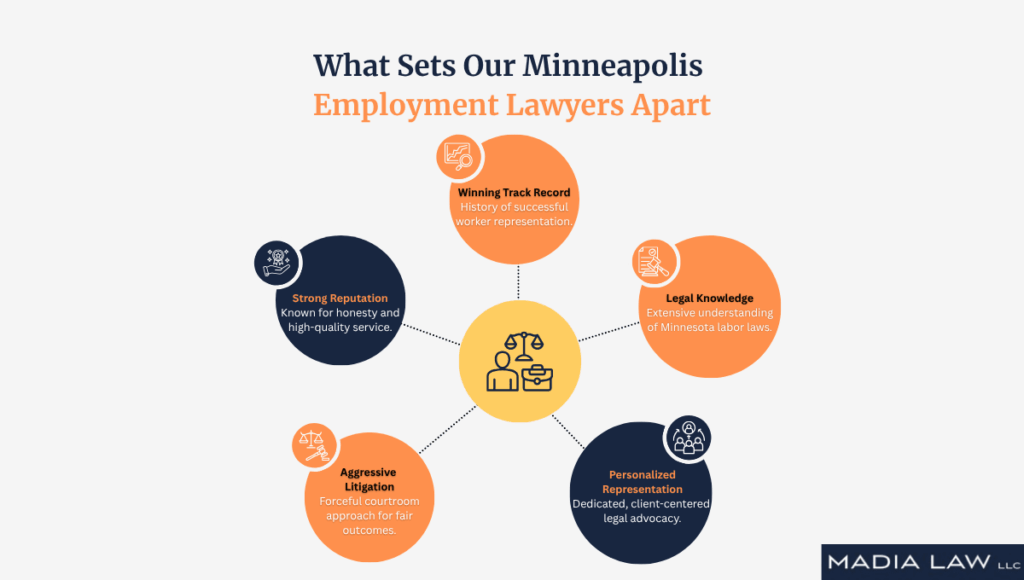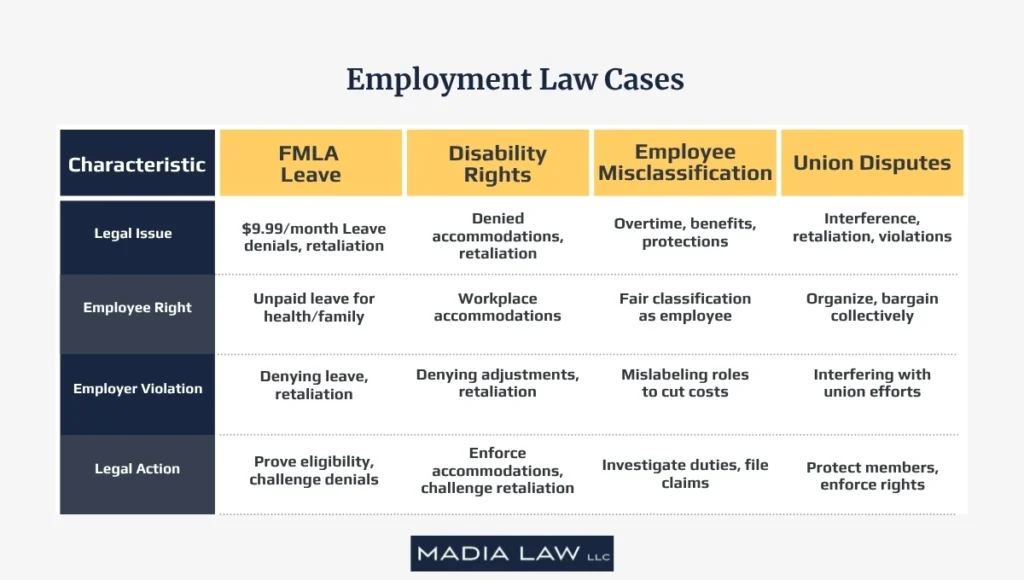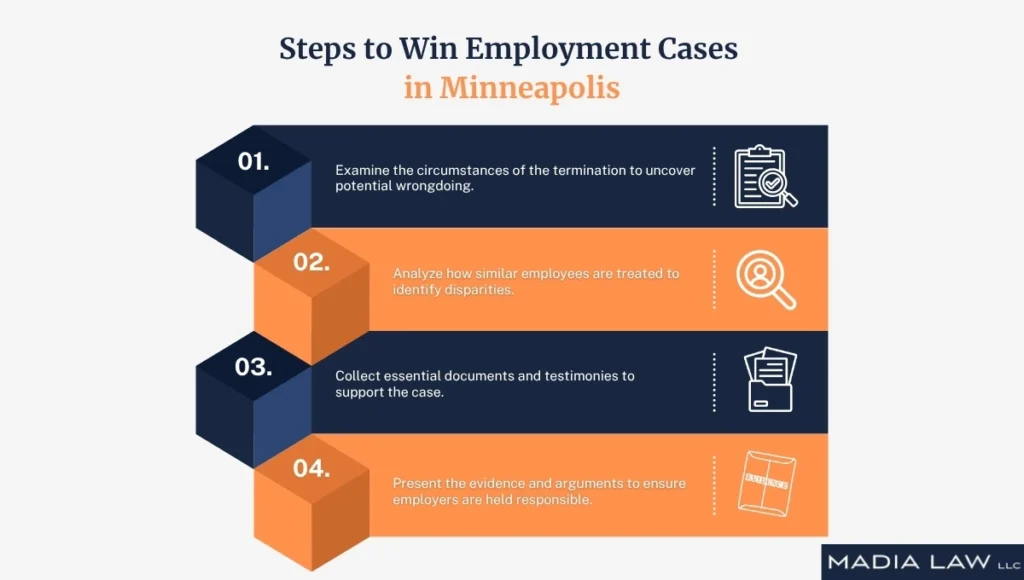
When you are facing problems at work, whether it is discrimination, harassment, unpaid wages, or wrongful termination, it is easy to feel overwhelmed and unsure of where to turn. At Madia Law LLC, we help Minneapolis employees navigate complex workplace issues by holding employers accountable under Minnesota and federal laws.
We represent employees dealing with everything from FMLA violations and workplace retaliation to ADA claims and wage disputes. Our job is to help restore fair treatment and get you the compensation you deserve, while you focus on moving forward with confidence.
Our firm has secured major victories for Minnesota workers, including a $4.5 million settlement in a partnership breach in St. Paul, $3 million in a disability retaliation case in Eagan, and $2.4 million for a Minneapolis-area whistleblower who stood up to employer wrongdoing.
It is time to explore your legal options if you are dealing with a workplace issue. Contact us today to get started.
Why You Need a Minneapolis Employment Attorney
Hiring an employment attorney is the most effective way to protect your rights when workplace problems threaten your job, reputation, or financial security.
Our expert employment lawyers in Minneapolis help employees fight unlawful treatment, recover owed compensation, and avoid costly legal mistakes that could damage their claims.
At Madia Law LLC, we give workers the support, strategy, and courtroom strength you need to level the playing field against powerful employers.
Protecting Your Rights Under Minnesota Labor Laws
Employment lawyers enforce the legal protections that shield employees from discrimination, wrongful termination, wage theft, and unsafe work conditions.
Without professional legal representation, employees often lose out on defending their valuable rights by missing deadlines, failing to document misconduct properly, or mistakenly believing employers will act to resolve issues fairly.
For example, Minneapolis workers who are terminated after taking medical leave may not realize that the employer has violated both FMLA and state law. We identify potential violations early, build a strong legal case backed by evidence, and demand full accountability from the offending parties.
Guiding You Through Complex Minneapolis Employment Cases
Employees seeking to file claims often struggle with deadlines, miss opportunities to preserve evidence, or weaken their positions by speaking to employers’ attorneys without preparation.
We protect your workplace rights by leading you through investigations, complaints, and lawsuits and deploying the right strategies at every step. Whether you are facing workplace harassment or denied leave, we navigate you through the legal maze so you can focus straight ahead and move forward quickly to rebuild your career.
Getting You Maximum Compensation After a Dispute
When your career or livelihood is harmed, you deserve full justice, not just partial compensation. But without proper representation, many employees are prone to accepting lowball settlements that fail to cover lost wages, emotional distress, legal fees, or punitive damages available under law.
We have helped thousands of Minneapolis workers recover substantial back pay, front pay, and significant awards for the emotional harm suffered from workplace discrimination. We work aggressively to calculate, prove, and pursue every dollar you deserve.
Leveling the Field Against Employers and Insurers
When you are fighting powerful employers, you need experienced legal firepower behind you. Without legal counsel, individual workers often face sophisticated corporate legal teams designed to intimidate, delay, and minimize their claims.
You deserve a powerful legal team fighting for you if your employer broke the law. At Madia Law LLC, we have successfully taken on some of the largest corporations in the country on behalf of Minneapolis employees. Our litigation experience, trial skills, and willingness to go the distance give our clients true negotiating power.
Avoiding Legal Pitfalls with Expert Guidance
When protecting your future, expert legal strategy from day one makes all the difference. Employees can accidentally weaken their cases by posting on social media, missing administrative filing deadlines, or failing to document retaliation properly without timely advice.
Our attorneys ensure every action you take from the start supports your legal rights. We guide you on how to avoid common traps that employers and their lawyers use to defeat claims before they even start.
For a legal consultation with a employment lawyer serving Minneapolis, call 612-349-2729
What Sets Our Minneapolis Employment Law Attorneys Apart
Choosing the right employment lawyer can change everything. At Madia Law LLC, we combine deep Minneapolis legal expertise with courtroom-tested procedural capability to help workers secure real, meaningful results.
We know each of the local county courts well (e.g., Hennepin, Ramsey, Dakota), the intricacies of Minnesota employment laws, and how to hold Gopher State employers accountable when they violate statutes. Our team brings to every case significant trial victory experience, aggressive negotiation skills, compassionate client-focused service, and a sterling reputation for integrity.
We have secured millions in litigation awards for Minnesota workers, winning cases that changed lives and set new standards for justice. Our results include:
| 3 Million
Settlement procured 2 weeks before scheduled trial, for an employee who was terminated after disclosing a disability and requesting a reasonable accommodation. |
2.4 Million
Settlement procured on behalf of a brave employee who was terminated after reporting gender discrimination in the workplace. |
2.1 Million
Jury verdict reached on behalf of an employee who was terminated after reporting concerns of race discrimination on behalf of a fellow employee. |
| 1.95 Million
Settlement reached on behalf of 4 employees who were terminated after reporting sexual harassment and assault on the job. |
1.3 Million
Jury verdict reached in favor of an employee who was discriminated against due to his disability and who was ultimately terminated after formally reporting the discrimination. |
650k
Settlement reached on behalf of two employees who were terminated after seeking out Worker’s Compensation Benefits following workplace injuries. |
These victories show the full extent of what is possible when you have the right trial team fighting for you. We are ready to fight today, just as we have for countless Minnesota employees before you, if you are facing unfair treatment at work.
Minneapolis Employment Lawyer Near Me 612-349-2729
Help for Minneapolis Workers Facing Unfair Treatment
Unfair treatment at work can take on many forms, including harassment, discrimination, wrongful termination, underpayment, or retaliation for speaking up. These actions can harm your income, your career, and your dignity.
But under Minnesota law, you have clear rights, and you do not have to accept mistreatment in silence. We stand with Minneapolis/St. Paul workers who deserve dignity, respect, and a workplace free from illegal actions.
Here are the most common workplace violations we help employees across the MSP metro area address.
Wrongful Termination: Was Your Firing Illegal Under State or Federal Law?
Minnesota is an at-will employment state, which means employers can fire workers for any lawful reason or no reason at all. Firing becomes illegal when it violates rights under laws like Title VII, the ADA, the FMLA, or the Minnesota Human Rights Act (MHRA).
Wrongful termination occurs when employees are fired because of protected traits such as race, gender, disability, or in retaliation for reporting misconduct, requesting medical leave, or exposing illegal practices.
Our lawyers investigate beyond the employer’s stated reason, scrutinizing documents, emails, and internal records to uncover the true, and oftentimes illegal, motive behind a firing.
Speak with an experienced wrongful termination lawyer to protect your rights if you believe your termination was unfair.
Harassment and Bullying at Work: What You Can Do
Workplace bullying becomes illegal harassment when it targets a protected trait like race, gender, age, disability, or religion under laws such as Title VII or the MHRA. Casual rudeness is not enough; harassment must create a hostile, abusive work environment based on discrimination.
Document everything if you are being harassed: save emails, texts, notes of incidents, and names of witnesses. Strong documentation often proves patterns that employers try to deny. We use this evidence to expose unlawful behavior and build strong legal cases.
Don’t wait if you’re facing harassment. Talk to a sexual harassment lawyer today to strengthen your case and protect your rights.
Discrimination at Work: Know Your Rights
Federal and Minnesota laws protect workers from discrimination based on race, color, national origin, gender, pregnancy, disability, religion, age, and sexual orientation. Discrimination is illegal when it affects hiring, promotions, pay, job assignments, or terminations.
For example, refusing to promote a qualified woman while promoting less experienced men violates Title VII. In one recent case we handled, a Minneapolis tech worker was fired after reporting racial bias, and we fought to win her due justice.
Our experienced discrimination lawyers know how to identify patterns of discrimination and hold employers accountable for their actions. Reach out to us today if you believe unfair treatment cost you a job opportunity.
Not Paid Fairly? We Handle Wage and Overtime Disputes
Wage theft happens when employers fail to pay workers properly for the hours they work. Common violations include unpaid overtime, forcing employees to work off the clock, and misclassifying them as contractors to avoid providing benefits.
Employment lawyers prove wage theft by gathering timecards, pay stubs, emails, and schedules that expose discrepancies. Our unpaid wages lawyer in Minneapolis, MN, will fight competently and relentlessly to recover every dollar you are owed.
Protection for Speaking Up: Retaliation & Whistleblower Claims
Workplace retaliation happens when an employer chastises or punishes an employee for reporting illegal conduct, discrimination, harassment, or safety violations. Qualifying retaliation types can include being demoted, fired, reassigned to less desirable duties, or denied promotions for speaking up.
The Minnesota Whistleblower Act protects workers who report wrongdoing, whether internally or to government agencies. At Madia Law LLC, we hold employers accountable and will move to prosecute to the furthest extent of the law when they punish employees for doing the right thing.
Click to contact our Madia Law Practice Areas today
Types of Employment Law Cases We Handle in Minneapolis
Employment law covers a wide range of workplace issues. Whether you are facing wrongful termination, harassment, unpaid wages, retaliation, or leave violations, we are ready to be of assistance.
FMLA Leave Denials and Medical Leave Issues
The Family and Medical Leave Act (FMLA) gives eligible employees the right to take unpaid, job-protected leave for serious health conditions, family care, or childbirth.
Employers break the law when they deny valid leave requests or retaliate against workers who exercise their rights. We help prove FMLA eligibility, challenge wrongful denials, and fight retaliation claims.
Disability Rights and Workplace Accommodations
The Americans with Disabilities Act (ADA) and the Minnesota Human Rights Act (MHRA) protect workers with disabilities from discrimination and guarantee reasonable workplace accommodations. Employers violate these rights when they deny necessary adjustments, retaliate against, or unfairly fire employees with disabilities.
Our attorneys help employees enforce their right to accommodations, challenge retaliation, and pursue claims under the ADA and MHRA. Taking action early can protect your career prospects and well-being if your employer refuses to meet your needs.
Employee vs. Contractor Misclassification Problems
Misclassifying employees as independent contractors cheats workers out of overtime pay, benefits, and legal protections and exposes them to tax liabilities.
Employers often mislabel roles to cut costs, leaving workers without rightful compensation. At Madia Law LLC, we investigate job duties, gather wage records, and file claims for back pay and lost benefits.
Union Disputes and Collective Bargaining Issues
Workers have the right to organize, bargain collectively, and advocate for better conditions under the National Labor Relations Act (NLRA). Employers break the law when they interfere with union efforts, retaliate against organizers, or violate collective bargaining agreements.
Our employment lawyers protect union members and workers from unlawful retaliation and fight to enforce their rights under the bargaining agreement. Legal action can restore the protections you deserve if your employer undermines your rights to organize or negotiate.
Complete a Case Evaluation form now
How We Build and Win Employment Cases in Minneapolis
A successful outcome depends not just on what happened, but on how accurately the incident can be proven. Here is a snapshot showing how our Minneapolis employment lawyers build your case from day one.
Investigating Wrongful Termination and Employer Motives
Employers often hide illegal reasons behind false claims of poor performance or restructuring. We investigate termination records, performance reviews, emails, and witness accounts to uncover the real motive.
We know how to spot patterns of retaliation, discrimination, or pretext, and we bring the truth to light to strengthen your claim.
Comparing How Employers Treat Similar Employees
Proving bias often requires showing that others were treated differently under similar circumstances. We compare your treatment to coworkers in similar roles, reviewing promotions, pay, discipline records, and terminations.
When a pattern of favoritism or unfair targeting appears, we record it and then use it to prove discrimination, retaliation, or wrongful firing.
Gathering Critical Evidence for Your Case
Strong cases are built on solid evidence. We collect documents, emails, text messages, HR files, performance reviews, time records, and witness testimony to prove misconduct or contract violations.
Every piece of evidence builds up to the larger story that supports your right to compensation and justice.
Holding Employers Accountable
Employers have a legal duty to enforce anti-discrimination, wage, and harassment policies. We show when companies fail to investigate complaints, ignore patterns of abuse, or allow retaliation.
By exposing negligence or indifference, we hold employers responsible and push for maximum recovery for our clients.
Damages You Can Recover After an Employment Dispute
Damages are financial compensation awarded to make up for harm caused by illegal workplace actions. They can include lost wages, emotional distress, legal fees, and, in some cases, punitive damages.
The applicable type and amount of damages depend on the case, whether wrongful termination, discrimination, wage theft, or harassment. We work to calculate, document, and fight for every dollar you deserve, including hidden or overlooked damages.
Lost Wages and Benefits
Lost wages and benefits cover the income and perks you missed because of unlawful firing or underpayment. This can include back pay, front pay, lost bonuses, unpaid commissions, lost health insurance, and missed retirement contributions.
We use payroll records, offer letters, benefits documents, and expert testimony to accurately calculate and recover these amounts.
Emotional Distress and Punitive Damages
When workplace discrimination, harassment, or retaliation causes emotional harm, you may be entitled to compensation for distress. Emotional damages recognize the pain, anxiety, or reputational damage suffered because of employer misconduct.
In rare but severe cases, punitive damages designed to punish extreme employer behavior and deter other employers from similar behavior can also be awarded.
How We Handle Legal Fees and Settlement Talks
Many successful employment cases allow workers to recover their attorney’s fees from the employer. We also negotiate settlements aggressively, working to maximize your recovery while avoiding unnecessary delays and costly trials whenever possible.
Our lawyers guide you through every settlement offer and fee arrangement with full transparency.
Speak With a Minneapolis Employment Attorney Near You Now
Acting quickly after workplace mistreatment in Minneapolis protects your legal rights and strengthens your case. Waiting too long can weaken evidence, cause important deadlines to be missed, or limit your ability to recover.
At Madia Law LLC, we offer confidential, supportive case reviews to help you understand your options and take action. Our Minneapolis employment lawyers are ready to listen, guide you through every step, and fight for the justice you deserve. Contact us today to start protecting your future.
Labor Lawyer vs. Employment Attorney: Who Should You Hire?
The type of lawyer you need depends on the problem you are facing at work. Employment attorneys help individual workers with issues like wrongful termination, harassment, discrimination, wage theft, and retaliation. Labor lawyers specialize in union matters, such as collective bargaining disputes and unfair labor practices.
Our Minneapolis employment lawyers are here to help if you are dealing with mistreatment, discrimination, or pay issues. And we represent individual Minneapolis employees, not their unions, when their individual workplace rights are violated.
Employment Law in Minneapolis: Your Rights and Responsibilities at Work
Employment law governs everything from hiring and firing to wages, safety, and protections against discrimination in the workplace. Both employers and employees in Minneapolis must follow overlapping federal, state, and local laws that define rights and responsibilities at work.
We help workers understand how these laws applicable operate, not just how their claims are filed. Knowing your rights and your employer’s obligations is the first step toward protecting your career and enforcing justice.
Overview of Federal vs. Minnesota Employment Laws
Federal laws, such as the Fair Labor Standards Act (FLSA), Title VII, and the Americans with Disabilities Act (ADA), set baseline protections for workers. Minnesota laws, including the Minnesota Human Rights Act (MHRA) and the Minnesota Wage Theft Act, add even stronger rights for employees in areas such as discrimination, medical leave, and wage enforcement.
Our acute understanding of both these levels of labor law helps us build stronger, more effective employment claims for Minneapolis workers.
How the Minnesota Human Rights Act (MHRA) Protects Workers
The MHRA protects workers against discrimination based on race, gender, disability, age, religion, sexual orientation, and more. It often offers broader coverage and stricter standards than similar federal laws.
When employers violate the MHRA, affected employees can pursue claims through the Minnesota Department of Human Rights or through court action with the help of experienced legal counsel.
How Government Agencies Enforce Employment Laws
Agencies like the Equal Employment Opportunity Commission (EEOC), the Department of Labor (DOL), the Occupational Safety and Health Administration (OSHA), and the Minnesota Department of Human Rights (MDHR) investigate violations, impose penalties, and enforce workers’ rights.
At Madia Law LLC, we help clients navigate agency complaints, respond to investigations, and move cases forward when agencies fail to resolve the violations.
Legislative Updates: New Rules Affecting Minneapolis Workplaces
Recent legislative changes in Minnesota include stronger protections against wage theft, new paid sick leave requirements, and restrictions on non-compete agreements.
Staying updated on new workplace laws helps employees assert their rights and allows employers to remain compliant, avoiding legal risk.
Our team tracks every change to protect our clients’ interests and ensure no opportunity for justice is missed.
How Employment Law Shapes Workplace Culture in Minneapolis
Employment laws influence hiring policies, wage structures, workplace diversity initiatives, and how companies handle safety and harassment complaints.
In Minneapolis / St. Paul, legal standards are helping drive more inclusive, equitable, and transparent workplace practices across industries.
We believe informed workers create stronger, safer workplaces, and we work every day to push those standards forward.
Filing a Claim Before Hiring an Attorney
Before filing a lawsuit, many employment claims must first be reported to agencies like the EEOC or the MDHR.
Employees must meet strict deadlines, often 180 or 300 days from the discriminatory act, and should document every relevant event, communication, and complaint.
We guide clients through these early steps carefully to preserve their strongest path to justice.
Statute of Limitations: How Long Do You Have to File a Claim in Minneapolis?
The statute of limitations sets strict deadlines for filing workplace claims, and missing those deadlines can end your right to recover anything. Different types of employment claims have different filing deadlines, depending on the law and the specific facts involved.
Consulting a reputable Twin Cities employment lawyer early helps protect your rights, preserve evidence, and avoid missing key deadlines. Ongoing violations, internal complaints, or other factors can sometimes extend these limits, but it’s risky to wait.
Discrimination, Retaliation, and Wrongful Termination Deadlines
Workplace discrimination, retaliation, and wrongful termination claims must meet strict filing deadlines:
- EEOC complaints: 180 days after the discriminatory act (extended to 300 days if Minnesota law applies).
- MHRA complaints: 1 year from the discriminatory event.
- Wrongful termination lawsuits: Varies based on the legal theory, often 2 years for common law wrongful discharge, shorter for specific statutory violations.
Missing these windows can permanently bar your claim.
Wage and Hour, Unpaid Overtime, and Deduction Claim Timeframes
Wage-related claims also have clear time limits:
- Federal FLSA claims: 2 years from the date of the violation (3 years for willful violations).
- Minnesota wage theft claims: 2–3 years, depending on the specific violation.
- Claims against public employers: May involve shorter notice requirements or special procedures; acting fast is critical.
Timely action gives you the best chance to recover unpaid wages and penalties.
Take Control of Your Workplace Rights Today
You deserve powerful legal support and a clear path forward if your workplace rights have been violated. Our Minneapolis employment lawyers are ready to fight for the justice you deserve.
Call 612-349-2729 or complete a Case Evaluation form





